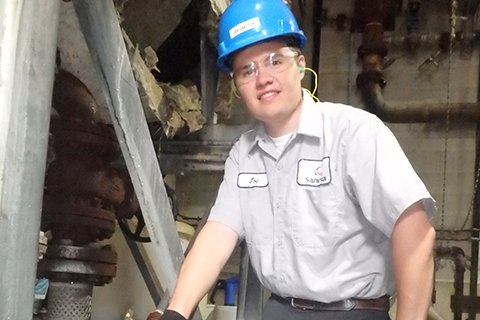Students at Work

Co-operative program offers CSE students meaningful work experience in real-world environments.
Written by Susan Maas
Hands-on work experience, academic credit, mentorship from working professionals, enhanced networking skills, hourly pay of $18 or more—there are lots of good reasons for students to participate in the engineering co-op program.
One of the biggest reasons? Co-op students give themselves a critical edge in the post-graduation job search process, said Frank Kelso, director of the engineering co-op program and a teaching professor in mechanical engineering. “Some employers tell us they actually don’t hire candidates unless they’ve been co-op students,” he said. “Power Engineering and Manufacturing (PEM) is one of those employers.”
Jim Blesener (EE ’87), vice president of engineering for PEM, said that on the rare occasion PEM does hire an aspiring engineer who didn’t participate in the co-op program, the company requires the new hire to do a co-op.
“The University teaches you all the important theory,” Blesener said—and then in the co-op, the rubber meets the road. “You learn about the bill of materials, how to communicate with manufacturing, how to work with a supplier. It’s a very valuable program.”
He knows that from the student’s perspective as well as the employer perspective. Blesener was a co-op student himself 30 years ago. The program’s been in place since 1950. Some of the 35 participating companies are staffed by multiple generations of former University of Minnesota co-op students. Current co-op employers include Andersen Windows, Medtronic, and Xcel Energy.
The program serves students majoring in mechanical engineering, computer engineering, electrical engineering, and as of this year, industrial and systems engineering. Unlike an internship, which usually lasts a summer and doesn’t provide academic credit, a co-op typically stretches over multiple semesters, giving students a deeper, more intensive full-time work experience.
“Co-op students are practically working engineers and they earn technical elective credits that count toward graduation. That’s not the case at most other universities offering engineering co-ops,” Kelso said.
Co-op students—usually juniors, sometimes seniors—work 40 hours a week. “You take a 13-credit waiver, which means you’re still a full-time student,” even though you’re not taking classes during that time, Kelso explained. Pay averages about $18 an hour. In some cases, students earn $20 an hour or more.
The application process is fairly involved and quite competitive. It begins with a job fair early in the semester. Companies send recruiters to provide information and answer students’ questions about their business. “Students try to get a feel for what it would be like to work at different companies. Everybody changes cards, the students hand out resumes,” said Kelso.
Next, after interviewing in person with multiple companies, students create a ranked list of their favorite prospects—and the companies do the same. Then Kelso and colleagues go through those lists and try to act as “matchmakers.”
Often (though not always), doing a co-op means taking an extra semester, or even an extra year, to graduate. Kelso tries to persuade students it’s well worth it. “A lot of companies, if you don’t have work experience, they’re not even going to look at your resume,” he said. “I tell them if they can get some experience now, they can have their pick of jobs.”
Read about these CSE students who worked in co-op positions.
